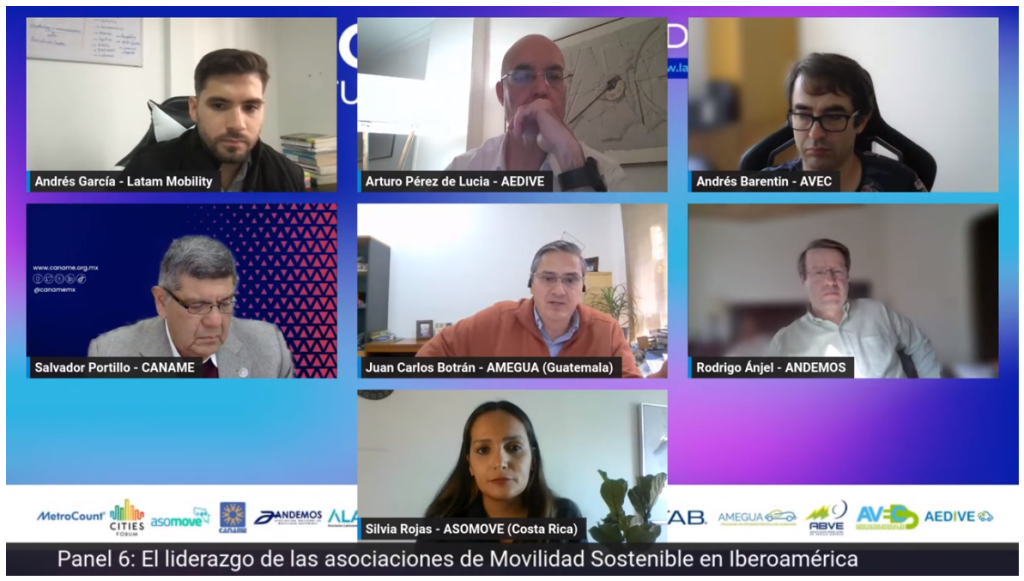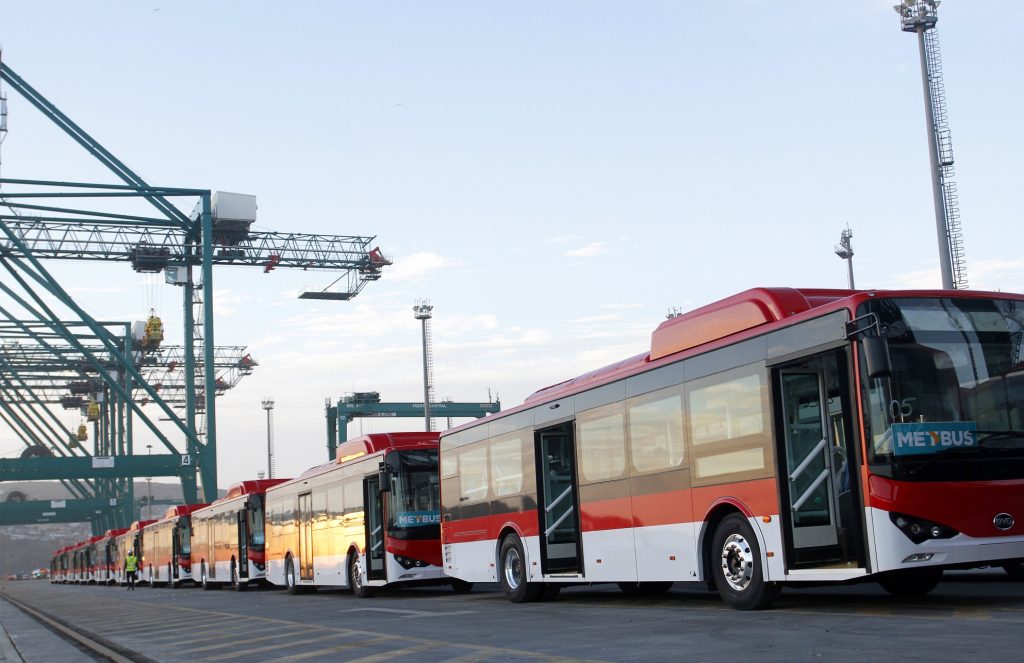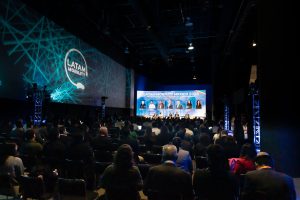Guilds play a fundamental role in all aspects of society to advance the objectives and development of each country. In the automotive industry and mobility, the organizations represent the spearhead to promote the massification of new technologies that translate into quality of life for people and protect the environment.
In this sense, the “Latam Mobility: Regional Summit 2023” was the setting for the panel “The Leadership of Sustainable Mobility Associations in Ibero-America”, to learn about the perspectives, progress and challenges in this area by the leading groups in the sector.
Silvia Rojas Soto, President of the Latin American Association for Sustainable Mobility (ALAMOS), highlighted the great growth and acceleration of sustainable mobility in the region.
She stressed that adopting electric vehicles generates benefits from the environmental point of view, with the aim of improving the quality of life of citizens and also provides business opportunities through economic development and boosting production chains.
“Many benefits are coming for the region and we must take advantage of them to accelerate the transition in public transportation, heavy and light duty vehicles, and massify electromobility,” said Rojas.
He urged people to inform themselves about zero-emission cars to dispel the myths and skepticism that still exist about new technologies, assuring that there are more and more innovations and cars with greater autonomy.
Essential Legislation in Chile
The president of the Chilean Association of Electric Vehicles (AVEC), Andrés Barentin, emphasized at the Latam Mobility forum that the regulations approved by the authorities are fundamental for the southern country to be among the leaders in the region in terms of electromobility.
“Clear regulatory frameworks are essential to foster virtuous ecosystems that allow electric mobility to accelerate, scale and begin to see projects and ventures,” he said.
Barentin affirmed that Chile has great renewable energy potential with notable copper and lithium production rates that link important production chains.
He urged all the actors involved to continue advancing in technologies that reduce knowledge gaps between companies from more developed countries, taking into account that in Chile there are local companies that build electric buses, export charging solutions with innovative electro-terminals, with the goal of avoiding dependence on imported components.
Related content: Metrocount, Waze, Kido Dynamics, Neoenergía and Clipp MaaS Present Proposals for Smart Mobility in Latin America
Colombia’s Outlook
Rodrigo Anjel, representative of the National Association of Sustainable Mobility of Colombia (ANDEMOS), was another distinguished panelist at the “Latam Mobility: Regional Summit 2023”.
He celebrated the efforts that have been made so far by the government sector, however, he considers that there is still a long way to go.
He pointed out that the organization he represents needs more direct contact with the authorities, although he is optimistic about the policies that are being adopted so far, which open up many opportunities through the National Development Plan.
Regarding charging points, Anjel pointed out that “the current infrastructure is insufficient. It is not yet possible to install chargers in residences or workplaces, so we need a better public policy in this regard giving benefits and complementing the law with more motivation”.
Mexico’s Mobility
Salvador Portillo, President of the National Chamber of Electrical Manufacturing of Mexico (Caname) considers it imperative that all actors involved in mobility-government, industry and civil society-work together to adopt measures that accelerate electromobility and respond to traffic congestion and environmental pollution.
“We are 120 companies that provide 200,000 direct jobs aimed at distributing electric energy. We are in the process of bringing together wills, we must provide solutions in the field of mobility,” he said.
Portillo stressed that it is essential to electrify public and private electric transportation in cities and between cities. “We are in the process of responding to the reality of manufacturing in neighboring countries, finding development opportunities that the pandemic has created, optimizing productive capacities and expanding them to adapt them”.

Optimism in Guatemala
Juan Carlos Botrán Briz, President of the Electric Mobility Association of Guatemala (Amegua) highlighted the great 2022 that the country experienced with important advances in mobility.
“We had a spectacular year with many milestones for electric mobility in Guatemala. We made a map of the ecosystem we needed and it became our goal to consolidate it, and we achieved it. We added players that had not been convinced, such as banks, academia and other government entities”, he explained.
He highlighted key regulations to motivate such as the Electric Mobility Incentives Law with fundamental guidelines to import and implement charging points.
“The legislation has brought benefits for manufacturers to see Guatemala as prepared and committed to electric mobility, traditional distributors are receiving units, something that did not happen a year ago,” said Bortrán.
He stated that the demand for electric vehicles exists and there are companies willing to migrate their fleet, which did not happen before because there were no units and that is changing. “This year will be a year of harvest, we will see the fruit of the preparation of this ecosystem,” he said.
The European Vision
Arturo Pérez de Lucia, General Director of the Business Association for the Development and Promotion of Electric Mobility in Spain (AEDIVE), was a prominent panelist at the “Latam Mobility: Regional Summit 2023”, in which he presented all the advances in Europe that serve as a guide for adopting new technologies in Latin America.
Along these lines, the executive explained that they are generating important links with organizations in Latin America to transfer knowledge and innovations.
Regarding the situation in Spain, he said that “we have a special ecosystem, we manufacture electric vehicles, chargers, we produce components for cars”.
He highlighted the growth of the guild, which started with 10 companies and currently there are more than 200. He stressed that the measures on the regulatory framework have been crucial for the development of electric mobility, achieving to join efforts between the public and private sectors.
Pérez de Lucía explained that the current geopolitical situation with the conflict between Ukraine and Russia has made it clear that Spain is a major producer of renewable energy, which has made it possible to reduce dependence on foreign countries by taking advantage of the great resources available, such as lithium.
The panelists of the Latam Mobility forum concluded that the promotion and massification of electromobility is not just an environmental necessity, but represents great opportunities for business and economic growth.







